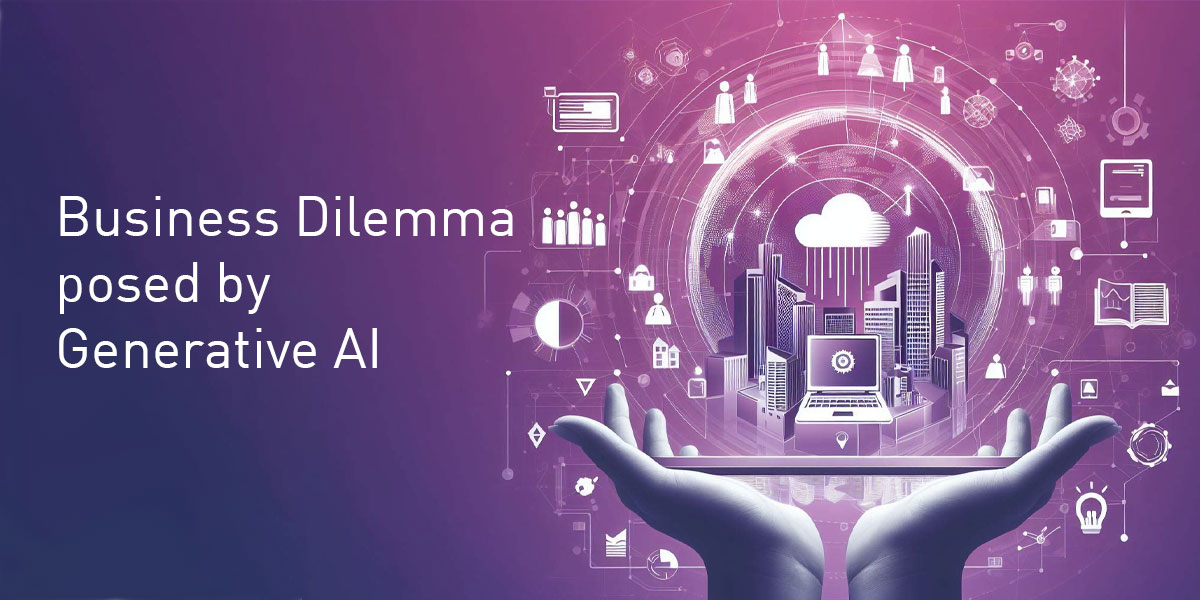Necessary cookies are absolutely essential for the website to function properly. These cookies ensure basic functionalities and security features of the website, anonymously.

The Business Dilemma posed by Generative AI
The advancement of generative AI is reshaping industry environments, presenting large opportunities for innovation, efficiency and growth. As businesses find themselves at this technological juncture, the choice between developing custom solutions or opting for pre-built platforms becomes a difficult strategic decision. This blog discusses the top level theory and decision points which businesses face as they choose their own way forward.

The Surge of Generative AI in Business
Generative AI represents a significant shift in how businesses innovate, engage with customers and streamline operations. Its primary appeal lies in its ability to generate new data and insights from existing datasets, enabling personalised content creation at scale, automating intricate decision-making processes and much more. Across sectors—from tourism and marketing to finance and healthcare—generative AI is proving to be an invaluable ally in driving business success.
Generative AI in Travel
Innovations such as Tripnotes.ai exemplify generative AI's capability to automate and personalise travel planning, simplifying itinerary creation by leveraging extensive data. Platforms like Microsoft Bing are enhancing search experiences with real-time chat and co-creation features, powered by advanced AI capabilities. These advancements underscore the technology's role in evolving the tourism sector, offering novel ways to engage and satisfy the modern traveller.
Content Generation in Marketing
The marketing domain has seen a shift with the emergence of AI-driven platforms like Jasper Campaigns, which revolutionises content creation by generating diverse marketing assets from a single brief. RAD AI and Lokalise AI showcase this trend, utilising data-driven insights and generative AI to craft personalised marketing strategies and content localisation, respectively. These tools highlight the potential of generative AI to streamline marketing efforts, enhance creativity and facilitate global brand communication.
Building vs Buying: The Dilemma
The Case for Building Custom Solutions
The benefit of crafting custom solutions lies in the ability to offer businesses an extraordinary level of control and flexibility, far surpassing what is available through pre-built platforms. This distinct pathway enables organisations to precisely tailor the technology to meet their unique requirements, ensuring that every aspect of the solution is aligned with their strategic objectives, operational workflows and customer engagement models.
Building custom solutions facilitates a deeper integration of generative AI technologies into the core business processes, allowing for a seamless blend of artificial intelligence with the organisation's existing data ecosystems and technological infrastructures. This level of integration is crucial for companies that rely on highly specialised data or complex operational models, as it ensures that the AI solution can effectively interpret and utilise unique datasets, thereby generating insights or outputs that are directly applicable to the business's specific context.
Moreover, opting to develop custom solutions affords organisations the opportunity to innovate beyond the limitations of off-the-shelf products. By designing a system from the ground up, companies can explore cutting-edge solutions of generative AI that are tailored to their industry's future needs and challenges, positioning themselves as leaders in technological innovation within their sector. This approach not only enhances competitive advantage, but also fosters a culture of innovation, encouraging continuous improvement and adaptation to emerging trends.
Another significant benefit of building custom solutions is the enhanced security and compliance posture that it can offer. Organisations operating in industries subject to stringent regulatory requirements or those handling sensitive data can design their generative AI solutions with built-in compliance and security measures tailored to their specific legal and operational frameworks. This proactive approach to compliance can automate tasks, mitigate risks, safeguard customer data and ensure that the organisation's use of AI remains within ethical and legal boundaries.
Real-World Use Case: Healthcare Diagnostics
A notable example is in the healthcare sector, where custom generative AI models are being developed to diagnose rare diseases from medical imaging. Such tailored solutions can significantly improve diagnostic accuracy and patient care by addressing gaps in existing medical AI applications, further illustrating the profound impact of custom-built AI solutions.

The Case for Buying Pre-Built Platforms
Conversely, opting for pre-built generative AI platforms brings a set of compelling advantages, chief among them being rapid deployment, cost efficiency and immediate access to state-of-the-art technology. These ready-made solutions stand out as particularly appealing options for businesses that aim to leverage the transformative capabilities of generative AI but face constraints in terms of development time, in-house expertise or financial resources required to engineer custom solutions from scratch.
The allure of rapid deployment cannot be overstated. In today’s fast-paced business environment, the ability to quickly integrate and operationalise AI technology can provide a critical competitive edge. Pre-built platforms are designed for swift implementation, allowing organisations to accelerate their AI journey and achieve immediate improvements in efficiency, customer experience and innovation. This speed to market means businesses can rapidly respond to evolving market dynamics, customer needs and competitive pressures, maintaining relevance and driving growth.
Cost efficiency is another significant advantage offered by pre-built generative AI platforms. Developing custom AI solutions requires substantial investment in research and development, talent acquisition and infrastructure, not to mention the ongoing costs associated with maintenance and updates. In contrast, pre-built platforms offer a more predictable and often lower cost structure, with the benefits of scale and shared development expenses. This cost effectiveness makes advanced AI capabilities accessible to a broader range of businesses, including startups and small to medium-sized enterprises that might otherwise be unable to afford the hefty price tag of bespoke development.
Real-World Use Case: Marketing Content Generation
The digital marketing realm provides a clear example, where agencies leverage pre-built generative AI platforms to efficiently generate creative content for client campaigns. This approach enables the production of high-quality, varied content quickly, catering to diverse client needs without the overhead of developing and maintaining custom solutions.

Conclusion
Whether building bespoke solutions, buying pre-built platforms or navigating a hybrid path, the key to success lies in aligning technological choices with business objectives. This tailored approach not only ensures the effective utilisation of generative AI's capabilities, but also positions businesses for sustained innovation and growth in an ever-evolving digital world.
As generative AI continues to influence industries, the strategic decision to build or buy becomes increasingly vital. By considering the insights and real-world applications outlined here, businesses can navigate their ecosystems more effectively, making informed decisions that propel them towards future readiness and success.






